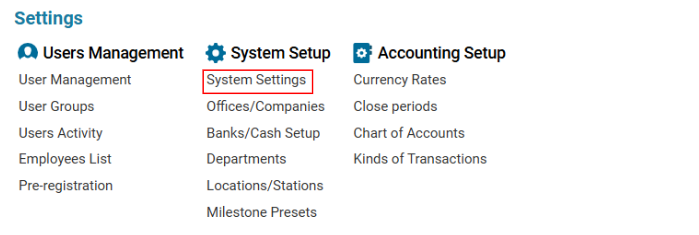Data Merging
Accessing Data Merging
Navigate to the Settings section and under the System Setup Section click the “System Settings” Button. Then under the Contractors/CRM Section click the “Data Merging" button.


Overview The Data Merging module enables users to consolidate duplicate or redundant records across contractor types. This feature helps maintain clean, structured, and non-redundant data, ensuring accuracy in customer, supplier, and employee records.
Main Functionalities
Contractor Type Selection
Users can select the Contractor Type from a dropdown menu to filter the relevant records before merging.
Main Contractor Selection
Users can select the Main Contractor from a dropdown menu to filter the relevant contractors before merging.
Data Table Columns
ID: Unique identifier of the record.
Company: Name of the company associated with the record.
Company Reg. Name: Registered Name of the Company.
Status: Indicates if the record is Active, Pending, or Inactive.
Compliance: Compliance status related to the contractor.
S.P.: Sales Person/Broker
Credit, D: Credit Days given to the Contractor.
Credit Amount: Amount of Credit given.
Cur: Currency.
Office: The office location associated with the contractor.
Code: Code for Accounting Purposes. Unique code can be generated per contractor to link to external systems.
Country & City: Geographic details of the contractor.
Email & Phone: Contact details of the contractor.
Prospect: Indicates if the contractor is a potential lead.
Created: Date when the record was created.
Date On Board: The onboarding date of the contractor.
External ID: A unique external identifier for the contractor.
IATA Case No: IATA reference number (if applicable).
Note: Additional comments or tags associated with the record.
Type: Specifies whether the contractor is a customer, supplier, agent or other.
Documents: The number of associated documents with the contractor.
How to Perform Data Merging
Select the Contractor Type from the dropdown list.
Review the displayed data table to identify duplicate or redundant entries.
Click the Check button to validate potential merges.
Click the Migrate button to merge selected records.
Confirm the action in the prompt to finalize the merging process.
Benefits of Data Merging
Eliminates duplicate records for better data integrity.
Improves system efficiency by reducing redundant data.
Enhances reporting accuracy by consolidating information.
